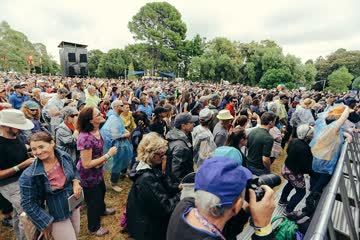James: "We Don’t Mind If Things Go Wrong. In Fact, We Like It"
Manchester natives James may have been around for 35 years, but right now they are delivering the best music of their career. Mark Hebblewhite chats with lead singer Tim Booth to find out what drives them on.

“Last year was our first time in Australia,” confirms James singer Tim Booth as he seeks to explain the huge delay in heading to our shores. “It’s funny although we are known as a ‘live band’ we tend to tour the same places over and over again rather than stretch ourselves. So, we’ve been pushing our manager to sort out places we haven’t been, like Australia.”
The experience was obviously a good one because just 12 months later and the band are coming back. “We had a wonderful time playing in Australia although we didn’t get to see much” laughs Booth. “Anytime you play for audiences that haven’t seen you before is special and the energy we got from the Australian crowds was phenomenal.”
“We have around 250 songs to choose from when putting together a set list and we can play around 80 or 90 of them on a soundcheck’s notice – so we are able to change the setlist every night depending on how we feel. This time around we have a new album that we are very proud of – so there will definitely be a chunk of that. But we’ll also be looking at what we played last time as well. So, for Sydney, say – we’ll deliberately try and play some songs that we didn’t play on the last tour. Sometimes we literally choose the set an hour before we go on stage because we want it to reflect what’s going on around us – it’s an approach that really works for us.”
"We are always striving to play a gig that you’ve never seen before."
Maybe it’s this ‘keep them guessing' approach that helps make James such a phenomenal live band. Where some acts are content to roll out note-perfect renditions of their records, James aren’t scared to deviate from the script with passionate improvised renditions that take the material in new directions without losing the essence of what made the tunes great in the first place.
“We love to improvise and I think that’s what has kept us going all these years,” admits Booth. “We deliberately include sections where anybody can do anything they want – it means as artists we’ve really got to pay attention to what all of us are doing – it keeps us in the moment and I think brings out the best in the band. I think it’s this approach that keeps people coming back to see us again and again – because they know they are going to get something different. We are always striving to play a gig that you’ve never seen before – and we don’t mind if things go wrong: in fact, we like it.”
James aren’t just friends on stage. Since returning from a hiatus in 2007 the band have churned out a series of superb records – each better than the last. You expect artists to say that their latest album is the best of their career, but with Living In Extraordinary Times this may just be the case. Ranging from the bombastic percussion of Many Faces right through to the gentle (yet subversive) and infectiously hummable Leviathan, this is a record that demands a strong emotional response. One song that has been getting a lot of attention is the bittersweet angst of Coming Home (Pt 2) – a ‘sequel’ to one of the band’s best-known songs, both of which deal with Booth’s struggles being away from his children. Were the band worried that they might somehow taint one of their greatest achievements with an inferior copy?
“Books do sequels, films do sequels – but not bands, especially after 24 years,” laughs Booth. “Really it was cheeky on my part because I could see the lyrical similarities between the two songs and the idea came into my head. It was more of an afterthought really to connect the two songs – so nobody was nervous that fans would react badly – and overall they have been very supportive.”
As absolute veterans of the music industry, James has seen firsthand the huge changes in how technology has impacted how music is both disseminated and consumed. Has this tumultuous change helped or harmed artists?
“Both I think,” offers Booth. “Technology has made it easier for more people to make music and listen to a wider variety of music – it means that people aren’t so ‘clannish’ in their tastes anymore – because it all comes free. And of course with that comes the negatives – because it’s free, music has become devalued. In some ways, technology companies sell computers with the promise of free music. It’s a challenge for all artists, but I think it’s one we can navigate.”







